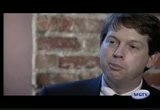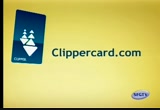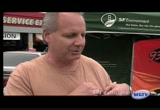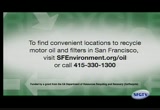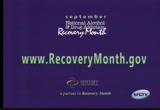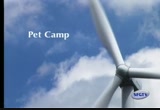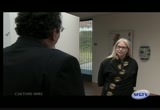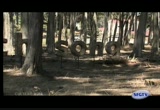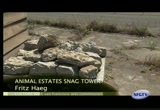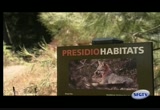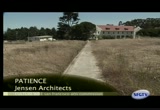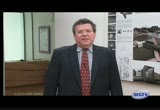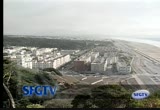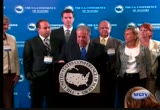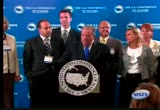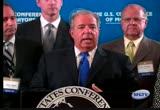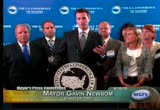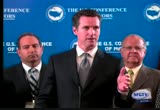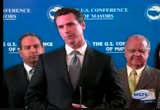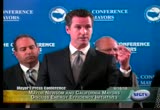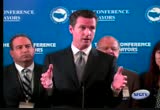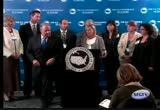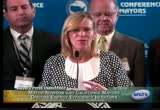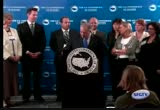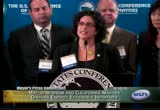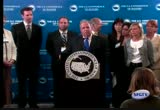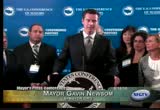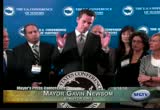tv [untitled] September 20, 2010 8:30am-9:00am PST
9:30 am
population that's in the other boat is disconnected from all that potential prosperity. >> we really need to promote content and provide applications that are really relevant to people's lives here. so a lot of the inspiration, especially among the immigrant community, we see is communications with people from their home country but we as much want to use the internet as a tool for people to connect within the local san francisco community. >> i think it's our job as public educators to give them this access and give them this opportunity to see that their efforts are being appreciated beyond their immediate reach. >> you have to blend this idea of community network with computer equipment with training and with support. we can pull all that together, then we've got it. >> it's as much about social and economic justice -- in fact it's more about social and economic justice than just
9:31 am
9:32 am
anyway, so now they know when a ticket to a. hal>> to you have something you want to get rid of? >> why throw it away when you can reuse it? >> it can be filtered out and used for other products. >> [speaking spanish] >> it is going to be a good thing for us to take used motor oil from customers. we have a 75-gallon tank that we used and we have someone take it
9:33 am
9:34 am
i've been clean four years! fifty-six ys! i've been in long-term recovery for 23 years. i've been in recovery for six months and love it! i've been in recovery for over 15 years! every september, people gather all across the country to celebrate recovery from addiction. i am so grateful for 19 years of recovery. it's changed my life, changed my children's lives. for information or for events near you, visit recoverymonth.gov get involved and join the voices for recovery.
9:35 am
9:36 am
dogs than children. finding a viable use for dog poop. >> proenvironmental policies, that's a way to win hearts and minds. >> hello, i'm meg, welcome to "culture wire." for this episode, the director of cultural affairs, luis, will take you on a journey through presidio has been tet. -- presidio habitat. >> welcome to "culture wire." today i'm at the presidio trust, a treasure within san francisco, because the presidio trust is really a national park in the center of an urban setting. it dates to the very founding of the city.
9:37 am
national park. toting me today to talk about this amazing exhibition at presidio habitat is cheryl hanes. can you tell me a little bit about the idea of the presidio habitat? >> succinctly, i have been long involved in the presidio. i was here when it was still a military base in the 1980's. i remember driving down walmart to the golden gate bridge and seeing the military guard at the gate and being utterly fascinated.
9:38 am
>> so presidio habitat is an exhibition where you have invited, how many artists to think about the habitat? >> we put together a list of possible participants, local, national, or international, of people who are concerned with environmental concerns, made some sort of contribution to the landscape and conversation we're having here. we said that broke -- proposal requests and we received 25 back. from that 25, we went through and chose tend to realize in the landscape. >> including this building, which is an amazing example of recycling. >> we are proud of this space. it was designed by a local
9:39 am
architecture team. we said, we need something that is a temporary structure, something that can be brought onto the presidio in pieces, act as an exhibition space for one year. we came up with the notion of shipping containers. it was important for us that we made this project for the place, of the place. what i mean by that is participants would also used repurchased materials. >> we will be speaking to one of the artists that you selected. what excited you about his idea? >> have many things. first of all, i am a fan of his architecture. because of that creativity, i knew that he could come up with something unique. i love the fact that he was
9:40 am
specifically addressing the landscape around here, and it was also about the human interaction with this place. >> what are your expectations with the people coming to presidio habitat? >> we really hope people will come with their family, dogs, and come back a number of times the works will change over the year. the feedback we are getting is you cannot do all of them on one visit. it is really better to come back and have different experiences. >> thank you. i am with mark jensen of jensen architect. he was one of the architects to be chosen to do the presidio habitat. when you heard about this project, what inspired you about that call?
9:41 am
>> our inspiration is a great blue heron. it was the site itself that attracted us. this is an incredibly beautiful outdoor room. we did a bit of reverse engineering once we knew we wanted to work here. which animals live here? the great blue heron jumped out at us. we walked around, and quickly, you get into another pace. you slow down, leave the city behind you. you can feel the wind and the breeze. in our increasingly frenetic, fast-paced, connected life, the chance to be of here and slow down a bit was part of the agenda. as part of the installation, it was suggested that this would be deliberately not mowed because
9:42 am
it would allow the sustaining of insects, plants, that would graduate -- that would gravitate to the area. >> that is right. i think you quickly notice that. >> thank you for being here. presidio habitat is an exhibition at the presidio trust. it will be in san francisco through may 2011. we hope you will come out to experience this amazing exhibition and great natural treasure. >> to learn more about the other habitats installations in the presidio, visit
9:43 am
9:44 am
this is a program that started in 2007, and it delivers funds directly to cities to be able to improve their energy efficiency, reduce their carbon footprint, and as important, create new jobs in our community. i will just give you a little background in this really quickly. program was originally thought of in 2005 when the u.s. conference of mayors launched its climate protection agreement. the agreement is a landmark measure across the country. the u.s. conference of mayors initiated it. it began with 141 mayors. it now has 1044 mayors that have signed on to the climate protection agreement, committing to reduce our climate footprint in each one of our communities. the energy block grant program has been an integral part of that. it gives us the resources to reduce our energy consumption
9:45 am
and reduce our carbon footprint, and as i said, it also creates jobs. it has been the result of a lot of people working together, but i do need to thank the speaker of the house, nancy pelosi, who worked hard to make this program a reality, and we would not be here today except for her efforts. on behalf of american cities, i want to thank the speaker for her commitment and diligence. without her help, as i said, this would not be here. i also want to thank president obama and his administration for his support of the program as well as the american recovery and reinvestment act, which is also to fund a number of new initiative projects in a number of our cities. as i said, we are here to work for efficiency and reduce our carbon footprint. in my city, we are investing about $4 million to accelerate private city efforts to reduce
9:46 am
energy efficiency in our city structures as well as some of our residential buildings, and we will hear in a moment from the mayors of other cities about what they're doing, but this program is exactly what we need to continue. it is really the only major funding source we have to be able to improve our efficiency and work on climate change issues, particularly by reducing our carbon footprint. we know that a successful plan for reducing u.s. energy consumption is grounded in local action, and all across this country, it has been demonstrated that local government can take action that is effective and not only reduces our impact on the environment but also puts people back to work. we have been leading the nation in this effort, and i have to tell you, it has been an innovative program that provides the flexibility needed to local governments, and it is the kind of thing that must be carried on in the future. i now would like to introduce a friend of mine and no stranger
9:47 am
to all of you, san francisco mayor gavin newsom, who is going to discuss what things have been going on right here in san francisco with this program. mayor newsom: thank you for your stewardship and leadership in bringing us all together. i thank all the mayors that are here and all of you for taking the time to be here. from our perspective, there are few things more important than this. at the end of the day, what we are really talking about, what we are organizing around is job creation and economic development, reducing the costs not only to government, but reducing the cost to individual businesses, large and small, that want to reduce their energy bill at the same time we advance our environmental principles and advance our collective goals. as many of you know, san francisco has a low global climate action plan. basically all that is is the
9:48 am
formal plan that 3043 other mayors -- at 1043 other mayors have signed to robot greenhouse gas unless it -- emissions to 1990 levels by 2012. we have done that through -- in small part in terms of that reduction. that is energy efficiency. that is the low hanging fruit. that is the easy part of this effort. we have some very ambitious goals nationwide. about half of that, most objective analysis has been done that shows that half of that can be achieved through energy efficiency, so you do not need something in the order of magnitude. just common sense. swapping out that level, taking the old boiler and replacing it, taking that call don t --hat --
9:49 am
that caulk gun in different respects. the think about it is it is so obvious and so easy but we were not achieving our goals until the president and speaker got together and demanded we get some block grants. we needed some energy development block grants and we needed some autonomy. let me conclude by making a jobs case, and i was making this just a moment ago, on why this matters. we get about $7.7 million through block grants, and we are using that jobs now program, the federal subsidy for direct jobs. 3600 jobs we have created. they are going out and doing energy audits, so we are doing free energy audits, and then we are using all these grants, and
9:50 am
then we are providing free resources for folks to actually deal with their boilers and other issues, but here is the big idea, and this is something -- if we put $1 billion -- you do not need to take $1 billion credit. you can just leverage the percentage that is arguably of to what $1.8 trillion that is just sitting there on the sidelines. just to leverage that money is guaranteed, like we do small business association loans, and start getting people to work today on energy efficiency and create real jobs. here's how we do it -- you get $1 billion just making this case, and you invest into coal, and generate about 870 jobs. sounds great, but you could generate 1000 or 1500 jobs in nuclear energy, but if you want to create more jobs and wealth and opportunity, 1900 jobs in
9:51 am
wind or about 3300 jobs, but the big game changer is retrofitting and green building. 7000 jobs for that $1 billion investment. you can just use the money that is sitting in all these financial institutions and guarantee those loans and get people back to work, doing the energy efficiency work that all these mayors are doing quite successfully, and you do it in rural and suburban areas, not just these big metro areas. get people to work, particularly those in the building and construction trades, those that have the highest rate of unemployment. that is the opportunity, and that is where we are trying to communicate, what we are trying to organize around. this is a win on all fronts, and this is being demonstrated in cities large and small across the country.
9:52 am
one of the successes of the stimulus plan is the focus on jobs and this economy. i want to thank everybody who is here and think cathy and her team for their leadership, and think mayor foster for helping bring all of you here to our city and county of sentences go. thank you. >> thank you, mayor newsom. >> i would like to bring our partner to the podium, the efficiency secretary, cathy joey. >> thank you all for coming. three quick points. on behalf of the president and secretary chu, let me underscore that energy efficiency is central to economic recovery from our perspective. we need to bleed into all the energy potential. americans spend $1.10 trillion on utility bills in their businesses and homes per year. we can become more efficient. that is $200 billion we can
9:53 am
save, and we can create jobs while doing it. for every billion that gets invested, 7000 jobs. this program will go on to create more. we love our partnership with the mayors. the mayors are working directly in investing money in cities on the ground, in buildings, schools, and communities. this program has 2350 grantees from across america that have programs under way this summer, demonstrating that investments in clean energy, green energy, helps economies. watch where the projects are. some of them are wildly innovative. some just make good sense. there are sensible, money saving light bulbs that should have gone in a long time ago. putting new elie de -- led
9:54 am
technology into traffic lights, which create safer streets. there are literally thousands of projects under way. take note of what those are. share information. in washington, we are very excited about our partnership. we are very excited about the energy savings that will come from this program and in the future. thank you all. >> thank you, madam secretary. finally, we will have another major address you with what is going on in her city. she is from the city of santa barbara. >> thanks you. i appreciate the opportunity to speak here. i think mayor newsom for your leadership from the beginning. hopefully, we can see some allocations after the first- round is moved around. that is important for congress to see the investment of this as not just an expenditure. the city of santa barbara has a little over 100,000 people. our funding was about $658,000.
9:55 am
we did lighting efficiency projects in four parks as well as some heating, ventilating, and air-conditioning retrofits in eight city buildings. the park's alone are saving 140,000 kilowatt hours annually, a savings of $88,000. the eecbg grants, coupled with other funding we did with our municipal building energy audit, is sitting as $150,000 in our general fund. along with the jobs that are being created with this project, when i came in and met with a number of mayors this morning, the first question has been how is your budget going. what is going on with your general fund and your public works? in our city, if we are able to save $150,000 a year that would have gone to paying for energy
9:56 am
bills, which can put it into police officers, firefighters, parks and recreation -- the municipal services people have come to expect. that is helping us get over this recession on top of giving private-sector jobs. it is saving energy at the same time. it is a great program. we need to keep it coming to the cities. i appreciate the leadership of the u.s. conference of mayors for having this meeting today. >> thank you, mayor schneider. are there any questions from anyone? >> i was just wondering about -- speaking of leveraging grants, clean energy loans. can some of that money come to this program? >> can you repeat that? i did not get all of that. i am sorry. >> we just passed with a lot of
9:57 am
fanfare and no follow-up, not because of good intentions but because of fannie and freddie. i was going to use the wrong adjective. [laughter] their unwillingness to be supportive of the program -- they are wrong. this is right. the president is right. congress, by and large, is right. all these mares are ready to go to do what -- all these mares are ready to go to do what the secretary started. the first program was done in berkeley years ago. it is simple. the company is not going to provide enough resources. how the finance those upgrades? -- how do you finance those upgrades? you can amortize them over the life of your mortgage in a way
9:58 am
that gives billions of dollars for the retrofitting of buildings. ours is the largest in the united states. we passed a more than $150 million appropriation. we were ready to go. we had dozens of people who had already gotten approval. then the word came out that fannie and freddie no longer would allow these because of the weight it relates to first orleans. i will not bore you with it. -- because of the way it relates to first liens. i will not bore you with it. it is a step to the screen economy. it is up to the folks running fannie and freddie. we need to see something change quickly. our attorney general filed suit, to his credit. mayors across the country are ready to voice, as well as governors, when we have a sympathetic ear from the
9:59 am
52 Views
IN COLLECTIONS
SFGTV: San Francisco Government Television Television Archive
Television Archive  Television Archive News Search Service
Television Archive News Search Service 
Uploaded by TV Archive on

 Live Music Archive
Live Music Archive Librivox Free Audio
Librivox Free Audio Metropolitan Museum
Metropolitan Museum Cleveland Museum of Art
Cleveland Museum of Art Internet Arcade
Internet Arcade Console Living Room
Console Living Room Books to Borrow
Books to Borrow Open Library
Open Library TV News
TV News Understanding 9/11
Understanding 9/11